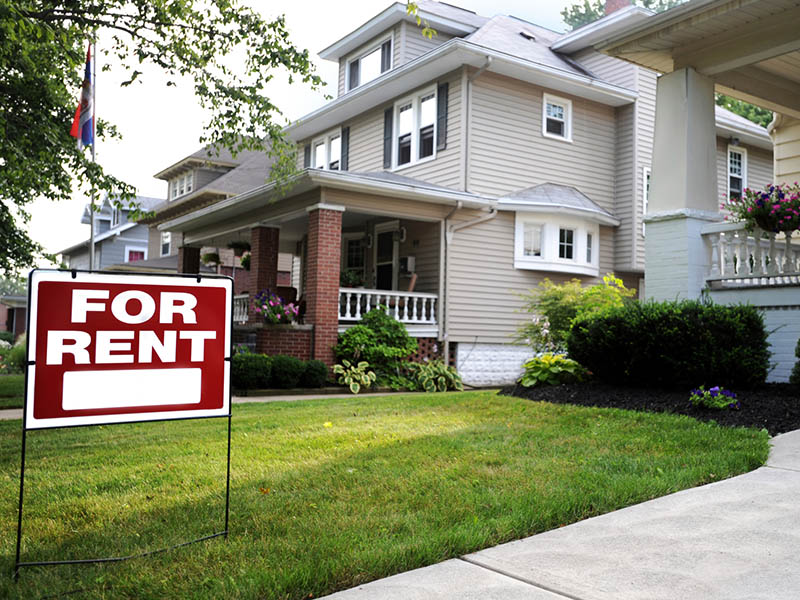
Investing in Bucks County rentals offers great potential, but success hinges on picking the right property and knowing how to manage it effectively. This guide walks you through key considerations and the buying process, giving you the insights to make your rental investment thrive.
Table of Contents:
- Key Factors to Consider When Choosing a Rental Property in Bucks County
- Steps to Investing in Homes for Rent in Bucks County, PA
- Property Management: DIY or Hire a Professional?
- Finding and Hiring the Right Property Manager
- When DIY Property Management Might Work
- Invest in Your Bucks County Rental with 20/20 Real Estate
Key Factors to Consider When Choosing a Rental Property in Bucks County
Bucks County has long been a smart choice for rental investors who know the market. Thanks to its beautiful historic neighborhoods, excellent schools, and proximity to both Philadelphia and New York, it attracts steady interest from a wide range of tenants. For investors looking to make the most of Bucks County’s market, here’s what to prioritize when choosing a rental property:
Location
The neighborhood can make or break the success of a rental property. Areas with convenient transportation options, top-rated schools, and amenities like parks and shopping centers are highly desirable to tenants and typically command higher rents. Bucks County has several desirable neighborhoods, including Doylestown, New Hope, Levittown, and Yardley, each with their own benefits and characteristics.
Property Condition
It can be tempting to go for a “fixer-upper” at a bargain price but remember: every repair is an added cost and time delay. If a property needs too much work, you might find your investment quickly becoming a money pit.
Ideally, aim for properties that are in good shape with modernized features, such as updated kitchens and bathrooms. These details may cost more upfront, but they make the property more attractive to tenants, allowing you to charge competitive rent.
Operating Expenses
Routine maintenance, unexpected repairs, and utility costs add up quickly. Decide if utilities will be included in rent or charged separately, as this will impact both your operating costs and how tenants perceive the value of the rental. While you might choose to include set prices like ISPs (Internet Service Providers), it is normally better to make fluctuating costs such as energy separate from what is monthly paid for in the rental.
Property Taxes and Insurance
Taxes are often overlooked until they start cutting into your profits. Bucks County has a range of tax rates, depending on the area, and they can impact your rental income more than you’d think. Before buying, research the local property taxes to avoid any surprises and to keep your profit margins intact.
Also, there is the need for insurance. No one wants to think about disasters, but should anything happen, you’ll be glad you have it. Landlord insurance typically covers property damage, liability, and potential loss of rental income. Rates can vary, so it’s worth comparing premiums, especially since Bucks County properties in some areas may require higher coverage due to local risk factors.
Cash flow and ROI
Conducting research into other houses for rent in Bucks County, PA gives you valuable insight into vacancy rates and competitive rental pricing. Analyze tenant demand and the supply of similar rental properties to gauge whether the area you’re eyeing will support consistent occupancy. Additionally, identifying your target tenants—whether families, professionals, or students—can help tailor your property’s features and marketing efforts.
To evaluate profitability, calculate expected rental income against expenses like maintenance, insurance, and taxes. Positive cash flow is vital for sustainable investment, and assessing the property’s potential appreciation over time helps you understand its return on investment (ROI).
Financing Options and Legal Considerations
Financing can be trickier for investment properties, especially with typically higher interest rates and down payment requirements. It’s always worth shopping around for the best terms.
Landlord-tenant laws can be a minefield, especially if you’re new to the game. In Pennsylvania, specific laws dictate everything from tenant rights to eviction processes, so familiarize yourself or partner with a property manager who’s well-versed in local regulations.
Property Management
Decide early on if you’ll manage the property yourself or hire a professional property management company. DIY management requires time and organization, especially if you have multiple properties. Professional managers can handle everything from tenant relations to maintenance and legal compliance, which can free you up to focus on other investment opportunities.
Steps to Investing in Homes for Rent in Bucks County, PA
While buying a rental property in Bucks County can be an exciting venture with the potential for steady income, the process requires careful consideration and planning. Here’s a detailed guide to each step, ensuring you have a strong foundation for a profitable investment.
Research the Local Market
Different neighborhoods within Bucks County can vary greatly in terms of demand, vacancy rates, and property values. The best areas are obviously those with low vacancy rates and high demand, though these areas will also likely have higher investment requirements.
Additionally, consider the nearby amenities, school quality, and accessibility to major job centers, as these factors all influence rental desirability and property appreciation over time. Then, you’ll want to take a look at current rental rates to gauge potential income and make sure they align with your financial goals.
Secure Financing
A mortgage pre-approval will give you a clear budget and position you as a serious buyer. Unlike primary residences, rental properties generally require a larger down payment, typically 20%, due to the increased risk associated with investment properties. Familiarize yourself with the types of loans available to investors and consider discussing your goals with a lender with investment property experience.
Consult a Real Estate Professional
An agent who has experience handling places for rent in Bucks County, PA can offer insights on rental trends, tenant expectations, and property types that perform well in the local market. They can also advise you on the nuances of local zoning regulations or requirements that could affect your property’s rental potential.
Analyze Potential Properties
Start by calculating potential cash flow: estimate monthly rental income and subtract expected expenses like mortgage payments, property taxes, insurance, and maintenance costs. Bear in mind that vacancy is never or rarely 100%. Even if you operate a business model where you only entertain long-term tenants, there will be occasional times in between tenants when you will not have income. Always factor in a few months for these times.
Conduct Due Diligence
Once you’ve identified a property, arrange for a professional inspection to check for structural, plumbing, or electrical issues. An inspection report will reveal any red flags that could impact negotiations or future maintenance costs. A title search is also needed to confirm clear ownership and identify any outstanding liens or legal issues.
Make an Offer
With confidence in the property’s condition and value, work with your agent to craft a competitive offer. An agent’s local insight can be invaluable here, helping you make an offer that’s both strategic and in line with the market.
Close the Deal
Closing is where everything comes together. Finalize your financing by submitting the last documents to your lender and reviewing closing costs, which might include fees for inspections and title insurance. Your agent and attorney will guide you through signing the legal documents needed to officially transfer ownership.
Prepare the Property for Tenants
With ownership secured, get the property tenant-ready by making any necessary upgrades, like fresh paint, new flooring, or updated landscaping. These improvements don’t just make the space more attractive, they can also help you charge higher rent. Once it’s ready, put together a marketing plan to attract tenants, emphasizing features that align with your target tenant profile.
Property Management: DIY or Hire a Professional?

Many owners dive into rental investments without realizing just how hands-on it can be, leading to late-night calls, tricky tenant issues, and a mountain of paperwork. Let’s break down when it makes sense to hire a property manager and when DIY management might work.
Benefits of Hiring a Property Manager
A professional property manager can take a lot of weight off your shoulders. For many investors, the benefits go beyond convenience — the peace of mind knowing someone else is handling the details is invaluable.
- Dealing with Tenants
From screening tenants to handling complaints, property managers act as a reliable go-between. If you’ve ever dealt with a tough tenant situation, you know it can be one of the more stressful parts of being a landlord. A manager can step in, set clear expectations with tenants, and address concerns before they escalate.
- Efficient Maintenance Coordination
When a water heater breaks or a roof starts leaking, someone has to jump in fast. Property managers work with trusted contractors and coordinate repairs, which means you won’t have to rearrange your schedule to meet a plumber on short notice. This kind of proactive maintenance keeps small issues from becoming costly problems.
- Rent Collection and Financial Tracking
Chasing down rent or handling late payments can feel uncomfortable. A property manager will follow up, enforce lease terms, and keep financial records organized.
- Keeping You on the Right Side of the Law
Rental regulations are constantly changing, and staying up-to-date on landlord-tenant law isn’t something most people have time for. Property managers make it their business to understand these rules, helping you avoid legal pitfalls.
- Maximizing Rental Income
Property managers know how to set competitive rental rates based on the market, so your property doesn’t sit vacant, and you’re not undervaluing it. They work to get your property rented quickly and at a fair rate.
- Minimizing Vacancy Periods
By marketing strategically and ensuring a smooth turnover process, property managers help keep vacancy rates low. The goal is a steady rental income that you can rely on, without lengthy empty periods.
Finding and Hiring the Right Property Manager
When managing your Bucks County rentals starts to feel overwhelming, hiring a property manager can be game-changing. A professional property manager takes on the day-to-day tasks—tenant screening, maintenance requests, and rent collection—freeing you up to focus on other investments.
- To start, clarify what services you need. Do you want a full-service manager or just help with tenant placement?
- Real estate website Zillow recommends asking for referrals and reading online reviews to get a sense of each candidate’s reputation.
- Once you have a shortlist, verify credentials and ask about experience, particularly with properties similar to yours. A solid management company will have licensing and professional certifications.
- During interviews, discuss how they handle tenant screening, maintenance, and communication, which are crucial for smooth operations.
- Reviewing their management agreement is also essential; you’ll want to understand all fees, services, and termination terms upfront.
When DIY Property Management Might Work

If you live nearby, have some flexibility, and don’t mind wearing multiple hats, you might be able to manage your Bucks County rental yourself. DIY management can work — but it’s worth asking yourself if you’re up for the full commitment.
- Proximity Helps
If you live close enough to drop by for inspections or emergencies, that’s a huge plus. Owners living nearby can more easily keep tabs on their properties and step in when needed.
- Experience in Property Management
If you’re experienced, you know what to expect, whether it’s tense tenant interactions or complicated local regulations. But if you’re new to this, be prepared for a steep learning curve. There’s a lot to juggle, and it’s easy to feel out of your depth without the right background.
- You’ll Need Time, Organization, and Patience
Rental management is more than a few emails and occasional inspections. You’ll handle everything from tenant calls to rent collections to keeping records straight for taxes. The commitment can be daunting, and if you’re already stretched thin, DIY management can become overwhelming fast.
Whether you go DIY or hire a property manager depends on your goals, time, and experience. If you’re serious about building a rental portfolio, hiring a property management company can give you the bandwidth to focus on growth rather than the day-to-day grind.
Invest in Your Bucks County Rental with 20/20 Real Estate
Thinking about investing in Bucks County rentals? 20/20 Real Estate has the expertise and local insight to help you make smart, strategic decisions.
With our comprehensive property management services, we handle everything from tenant screening to maintenance, so you can enjoy a hands-off, profitable investment. Invest confidently in Bucks County—partner with 20/20 Real Estate for expert guidance and peace of mind.
Get in touch at 215.357.2020, via email, or leave a message here to get started.
